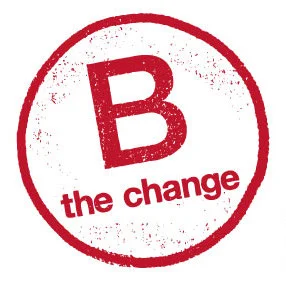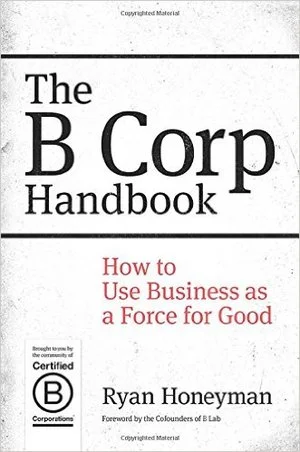Photo Credit: 2014 Skoll Awards / Flickr
““Leadership requires a level of moral courage.””
Andrew Kassoy is a recipient of the prestigious Skoll Award for Social Entrepreneurship and co-founder of B Lab, a nonprofit organization that harnesses the power of private enterprise to create public benefit. Prior to co-founding the B Corp movement, Andrew worked in the private equity business, including as Managing Director in Credit Suisse First Boston's Private Equity Department in London and as founding partner and President of international business of DLJ Real Estate Capital Partners. He is a Board Member of Echoing Green, a Henry Crown Fellow of The Aspen Institute and a member of the Aspen Global Leadership Network. In this interview Andrew reveals how the B Corp movement creates eddies of possibility by example.
On Leading Transcript
Seana Lowe Steffen, host: At a recent event you described B Corps as organizations using the power of business for positive social and environmental change. Why the focus on business and why now?
Andrew Kassoy, guest: Business represents something like 75 or 80% of GDP, and so while nonprofits and the public sector are necessary to solving major social and environmental problems, the reality is that the private sector is so big that if we want to solve big social and environmental problems, the private sector has to be part of the solution, not part of the problem. The second reason is that the structure of private sector activity makes it positioned to attract both capital and talent at scale in a way that the nonprofit and public sectors can’t, and so for certain kinds of problems, the private sector actually may be better for solving problems than others because of its ability to attract capital and talent at scale. There are places where the private sector can have an incredibly positive impact, and so that’s why we are focused on it. It’s not to say that the other things don’t matter, it’s just that somebody needs to focus on this.
Seana: When you speak to solving big social and environmental problems by leveraging the private sector, what is the ultimate change that you are envisioning?
Andrew: We are trying to create a global movement to redefine success in business so that one day all business competes not just to be the best in the world, but to be the best for the world.
Seana: What would you say then are the greatest obstacles to that happening?
Andrew: I think there are sort of two categories of obstacles: one are systemic obstacles or structural obstacles, and the other are cultural norms, and they are pretty related. So the systemic or structural ones have to do with 200 years of the development of institutions to support business that have been built to support business being done in a particular way, and those things are hard to overcome. So they include legal structures for business, and the fact that the laws of fiduciary duty in most places say that the job of the directors is to maximize value for shareholders and therefore they create an incentive for externalizing as many costs as possible onto the public, onto society. Then the lack of standards; standards that exist in the marketplace are about reporting financial return and risk, not for transparently reporting on impact or on externalized costs. So all of those institutional factors and structural factors have to be overcome, but they are very powerful. It’s a massive capital market and it’s set up on a certain set of rules that don’t favor doing business as if people and the planet matter. The other thing is about norms. It’s about what people believe the private sector is for – the idea from business school and law school to the popular press that business is for making money and that’s it; and people’s consumption behavior – which has until pretty recently been about finding the cheapest thing you can; and people’s investment behavior – which has been mostly about trying to find the highest return as quickly as possible without thinking about the consequences. So there is a whole job of changing cultural norms.
Seana: Thank you, that leads into my next question. I’ve heard you say that, “We play this vast array of roles in our lives, and in every one of those we have an impact.” What impacts are you seeing as a result of the outcomes of your work in this role?
Andrew: I think that it’s early to say how much impact this movement is having. When I think about the impact of the B Corp community, I think there are two kinds of impact. There is direct effect and then demonstration effect, and the latter is more indirect. So the direct effect is what is actually happening to these businesses and their stakeholders as a result of them being part of the B Corp community. These companies stayed in business at a higher rate through the downturn than comparable businesses that weren’t B Corps. They are creating demonstrably higher quality jobs for their workers, and jobs that are more durable. They are growing in a way that other similar kinds of businesses aren’t. It’s hard to say that’s because they are B Corps, but I do think it’s easy to say that they behave in a different way. The B Corp brand is helping create collective voice for a different kind of behavior. So that then flows into the demonstration effect, which I think over time will be the bigger impact. The message is starting to resonate with the 70 million consumers who care about buying from companies that they believe in, and having the collective voice of this community starts to make that possible.
Seana: What are some best examples you see of B Corps demonstrating restorative leadership in action?
Andrew: There are so many, that’s what inspires me. What are some great examples? There is a company here in New York that I’ve spent a lot of time with recently called CHCA, Community Home Care Associates. They are actually a co-op, and they are almost a $50 million company owned by the 2,000 or so home care workers who work there. These are often immigrant workers who this company is serving both by creating jobs for them and then helping them get to higher levels of education, higher levels of skill. It’s a traditionally very low wage industry insisting on higher quality working conditions and benefits for them and then creating, through collective voice, policy change to serve other low-wage workers. It's a pretty cool company and growing quickly, and it has had a huge influence on the quality of life not just for those 2,000 workers who own the company but on other people who work in that industry because of their efforts on the policy front. Another example, Greyston Bakery recognized that there is a community in Yonkers full of a lot of young women with children who don’t have work and a lot of men coming out of prison who mostly end up back in prison and said, "We need to build a business that can serve these people. We can help them rebuild their lives and create skills for them." So they’ve got this now famous motto that says: We don’t employ people to bake brownies. We bake brownies to employ people. And they have an open hiring policy, so you put yourself on the list and it doesn’t matter what your skills are or who you are, when a job opens up, the next person on the list is offered that job. What they do by doing that is they create the opportunity for people to restart their lives and teach them skills and then help them go out and find better jobs out in the world. They have a 20-year track record of doing that. It’s pretty amazing.
Seana: That is so amazing! I didn’t know that hiring policy.
Andrew: Yep, it’s extraordinary. Absolutely extraordinary, you know, and very hard. That’s a really hard way to run a business. But that’s why they run the business. It’s why the business exists.
Seana: Above all else, what would you have all leadership do at this time in our planet’s history?
Andrew: I think the very idea that you describe of restorative leadership, which recognizes the interconnectedness of all things. Having people behave and having leaders behave ethically in the recognition that their decisions and their actions have consequences because we are all interdependent, with an eye towards not themselves but the betterment of the whole society, is what we need now.
Seana: What gift of insight or wisdom that you’ve gained on your own journey would you offer those working for that positive change we are envisioning?
Andrew: Well, I’m not sure I’ve got a lot of wisdom to offer but change takes a really, really long time, and so we all have the responsibility to just stick with it and recognize that much of the change that we seek in the world will come, that we may be planting the seeds now but it will come long after we are gone, and all we can do is try to drive it in the right direction and stick to it. And a second one is, I guess I have a message about moral courage, that leadership requires a level of moral courage.
Share Andrews's Restorative Leadership Message
Click each social media image to download and share! #leadershipmatters #onleading
Redefine Success in Business
B Corp is to business what Fair Trade certification is to your coffee or USDA Organic certification is to your veggies.
B Corps are for-profit companies certified by the not-for-profit B Lab to meet rigorous standards of social and environmental performance, accountability, and transparency.
Today, there is a growing community of thousands of Certified B Corps from countries and industries around the world working together toward 1 unifying goal: to redefine success in business.
Drawing on best practices from 100+ B Corps, The B Corp Handbook: How to Use Business as a Force for Good, by Ryan Honeyman shows that using business as a force for good can help distinguish your company in a crowded market, attract and retain the best employees, and increase customer trust, loyalty, and evangelism for your brand.









